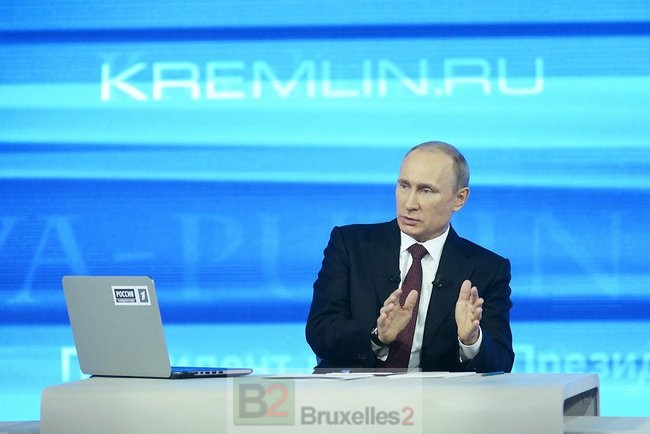The draft euro zone treaty is written. Text and some comments (Maj)
(BRUSSELS2, analysis) The economic crisis is a "security" threat in the same way as others, as Defense Minister Leon Panetta rightly pointed out recently. B2 could therefore not ignore the new Treaty that will be implemented in the European Union. We know more since this afternoon. The text has just been distributed to the Member States, with the aim of translating as quickly as possible into legal provisions the political agreement reached at the summit on 9 December between the leaders of the Euro zone. The objective - as stated in Article 1 - is to achieve a " strengthening fiscal discipline, coordination and governance ».
An original method
What is as interesting as the content is the working method: this text was prepared by the Council's lawyers in liaison with those of the Commission - the Member States not being associated -, then transmitted to the Member States. But it is rare for the press to be associated with this point since a briefing was organized at the council in order to give the press the first elements contained in this text.
The text transmitted to the Member States will now be dissected and commented on. The first work will then take place in a "Eurozone" working group extended to all members of the European Union (including the British), then should go directly to the Heads of State or Government. The technical discussions will also take part in the European Commission and the European Parliament, each delegation will have 3 members. The objective is to achieve a signature in March. The place is not fixed. But the general opinion is that the easiest way would be to do it on the sidelines of one of the European Councils, in Brussels. An informal summit has already been convened on February 3, in order to refine the discussions.
An international law agreement
This agreement is a classic international agreement, and not a Community agreement, even if it gives the Community institutions (Court of Justice, etc.) certain powers. It therefore obeys the rules of international law, in particular for everything that is not mentioned in this text.
It is written in English (which is not usually followed in the legal services of the EU, where the Treaties were often written in French).
It comprises 14 articles divided into six titles: objective, content and relations with Community law, budgetary discipline, economic convergence, European summits, final provisions.
Who does it apply to?
The contracting parties of the agreement are the States of the Euro zone. It is to them that it applies in priority. But it can also be applied by the other States of the European Union which subscribe to it and ratify it. The latter even benefit from a privileged regime because they can choose to apply voluntarily one or more provisions of the Treaty.
All Member States having indicated their willingness to participate in this agreement have the same rights “, whether or not they are members of the euro zone, specifies a lawyer. The United Kingdom has indicated from the outset that it does not want to be a party to the agreement, so it will be an "observer".
The parties undertake to apply this agreement in accordance with the European Treaties and European law ". This text " cannot contradict the provisions already in force or which fall within the competence of the EU (section 2).
When does it come into effect?
This agreement enters into force the month following the 9th ratification by a State party. What is a break with the principle in force of the unanimity necessary for the ratification in application in the European Union since its creation. On the other hand, this practice is very common in international law. The Treaty will only be applicable to the States that have signed it, as and when they are ratified. A single point is applicable from the entry into force, to all: the holding of European summits. " You can't have participation based on whether you've ratified it or not." underlines a lawyer who participated in the drafting of this project.
How can it be modified?
This question is not mentioned. It must therefore be settled according to the rules of classical international law says a European jurist. In concrete terms, the Treaty can only be modified unanimously by the States participating in the agreement and having ratified it (and not only unanimously by the signatories). NB: however, it seems politically difficult not to involve at least the States of the euro zone, even those which have not ratified.
What happens in the event of a dispute?
Nothing is specified on this point. Apart from the competence of the European Court of Justice (CJEU) on the application of the golden rule. According to the law in force, it could therefore be the International Court of Justice that is seized. Or an arbitration body chosen according to the will of the States; why by the CJEU, in this case.
The content: discipline, convergence, summits...
The measures described repeat those contained in the agreement of 9 December, starting with the golden rule (balance of revenue and expenditure of public budgets (general government); compliance with a maximum deficit of 0,5% of nominal GDP per year, ensuring a safety margin in relation to the 3% excessive deficit target). This golden rule must be introduced in a mandatory way by a constitutional rule or of an equivalent nature. An automatic correction mechanism must be defined at national level - based on common principles. (article 3) Any breach of these principles may be reviewed by national courts such as by the European Court of Justice, to which the Treaty grants jurisdiction. NB: Unlike the Community procedure, only a Member State can complain to the Court (and not the European Commission). This further limits its scope.
The States undertake to reduce their average indebtedness by one-twentieth per year (article 4). Nb: A provision already provided in fact in the "6 pack" and which thus gives a rule of secondary law, a value of primary law.
They undertake to support the proposals for recommendations put on the table by the European Commission in the event of an excessive deficit, unless a qualified majority opposes them. The qualified majority being defined by reference to the European Treaty (article 7).
Convergence
Convergence measures are more political than truly legal. States undertake to take all necessary actions to strengthen their convergence, their competitiveness and improve the functioning of the economic and monetary union (article 9). They agree to use, if necessary and appropriate to enhanced cooperation on matters essential to the harmonious functioning of the euro zone (Article 10). They agree to discuss together the major economic reforms they plan (before implementing them). This coordination should involve the EU institutions (article 11). The national and European parliaments will be involved in certain discussions (article 12).
Summit meetings
The Treaty endorses the principle of Euro Zone summit meetings; their number is fixed at two or more per year (article 13) and not one every month, as desired by the Franco-German letter. It is a treaty destined to last “says a lawyer, we therefore need a provision that is adaptable and not linked to certain circumstances. The Member States of the Eurozone and the President of the European Commission take part in it, as well as the President of the Central Bank as a guest. The presidency of this summit will be fixed, entrusted to a president elected by a simple majority at the same time as the European Council elects its president and for the same duration.


Comments closed.